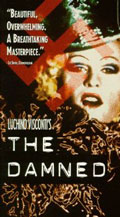
Directed by
Luchino Visconti
155 minutes
Rated M
Reviewed by
Bernard Hemingway

The Damned
The Damned, which is often loosely grouped with Death In Venice (1971) and Ludwig (1973) as the director’s "German trilogy", shifts from dealing with Visconti's characteristic subject matter - Italian upper class society during the Risorgimento - to a Germany about to embark on its disastrous affair with National Socialism.Specifically it looks at the Essenbecks, a wealthy family of steel manufacturers who find themselves having to deal with the rising Nazi Party. Family patriarch, Baron Joachim von Essenbeck (Albrecht Schoenhals), who represents the old aristocratic Germany, resigns himself to the new order and hands control of the company to his son and SA officer Konstantin (René Koldehoff) in preference to his real choice, Herbert Thallman (Umberto Orsini), But little does he know that Friedrich Bruckmann (Dirk Bogarde), an employee of the family firm and lover of his daughter, Sophie (Ingrid Thulin),is being groomed by SS officer and family relation Aschenbach (Helmut Griem) to take over instead. The Baron is murdered, Herbert is accused and flees leaving behind his wife (Charlotte Rampling) and their children. Sophie’s playboy son, Martin (Helmut Berger) becomes the major shareholder and at the behest of his mother makes Friedrich company president. The latter murders Konstantin on The Night Of The Long Knives. But Aschenbach decides to remove Friedrich and put Martin in his place as his puppet. Martin gives Friedrich and his mother poison and they commit suicide.
If the story with its intrigue, murder and sexual deviance is Shakespearean in conception, the heavy-handed script gradually becomes less credible as it becomes more allegorical. The final shot of SS officer Martin making the Nazi salute over the bodies of his dead mother and her lover aptly sums up the tendency to overstatement. In keeping with this agenda the dialogue is often didactic with Bogarde in particular getting some horribly obvious lines: “I’ve learned how to kill”, “I’ve followed a ruthless logic” (sic) and so on.
The problem with Visconti’s film it that its interesting aspect, one that he explored so gracefully in The Leopard (1963), the passing of the old social order, and which sustains the first part of the film is swamped in the second half by a near-hysterical litany of Nazi perversions. OK, it’s not of the order of Pasolini’s anti-Fascist tract, Salò, or the 120 Days of Sodom (1975) but it is so floridly exaggerated as to rob the film of its efficacy.
Want something different?





